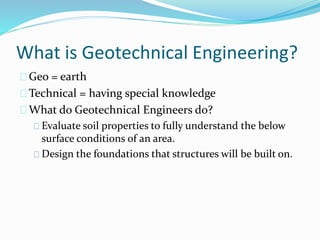More About Geotheta
More About Geotheta
Blog Article
How Geotheta can Save You Time, Stress, and Money.
Table of ContentsOur Geotheta IdeasThe Buzz on GeothetaOur Geotheta DiariesThings about GeothetaThe 2-Minute Rule for Geotheta

They carry out website examinations, accumulate examples, execute laboratory examinations, and analyze data to assess the suitability of the ground for construction projects - Geotechnical Engineers. Based on their searchings for, geotechnical designers offer referrals for structure layout, slope security, preserving frameworks, and reduction of geotechnical dangers. They team up with other specialists, such as engineers, architectural engineers, and building and construction teams, to ensure that geotechnical considerations are integrated into the total project design and application
By evaluating the behavior and homes of soil and rock, they can identify prospective geotechnical dangers such as landslides, soil settlement, or slope instability. Their experience assists protect against failures or crashes that could threaten lives and building. Here are some detailed tasks and responsibilities of a geotechnical designer: Site Examination: Geotechnical designers conduct website investigations to gather information on subsurface problems.
They analyze the data to comprehend the buildings and habits of the soil and rock, including their stamina, leaks in the structure, compaction attributes, and groundwater problems. Geotechnical Analysis and Design: Geotechnical engineers examine the data gathered throughout site investigations to analyze the security and suitability of the site for construction jobs. They execute geotechnical calculations and modeling to review variables such as bearing capacity, negotiation, slope stability, side earth stress, and groundwater circulation.
Not known Incorrect Statements About Geotheta
Foundation Layout: Geotechnical engineers play a crucial function in designing foundations that can securely sustain the designated framework. They evaluate the dirt conditions and tons needs to identify the proper foundation type, such as superficial foundations (e.g., grounds), deep foundations (e.g (https://www.abnewswire.com/companyname/geotheta.com_139529.html#detail-tab)., piles), or specialized strategies like soil improvement. They consider aspects such as settlement restrictions, bearing capacity, and soil-structure communication to create ideal foundation layouts
They review construction plans, monitor website tasks, and carry out field examinations to confirm that the design suggestions are followed. If unforeseen geotechnical concerns occur, they analyze the circumstance and give suggestions for removal or modifications to the layout. Danger Analysis and Mitigation: Geotechnical engineers analyze geotechnical risks and threats connected with the task site, such as landslides, liquefaction, or dirt disintegration.

Cooperation and Communication: Geotechnical designers function carefully with various other professionals associated with a project, such as designers, architectural engineers, and building groups. Efficient interaction and collaboration are necessary to integrate geotechnical considerations into the total task design and construction process. Geotechnical engineers supply technical expertise, answer inquiries, and make certain that geotechnical requirements are satisfied.
Top Guidelines Of Geotheta
Here are some sorts of geotechnical engineers: Foundation Engineer: Foundation engineers focus on creating and examining structures for website here frameworks. They assess the dirt problems, lots needs, and website features to establish one of the most ideal structure kind and layout, such as superficial foundations, deep foundations, or specialized techniques like heap structures.
They examine the elements influencing slope security, such as dirt residential or commercial properties, groundwater conditions, and incline geometry, and establish methods to stop slope failures and mitigate threats. Quake Designer: Earthquake engineers specialize in examining and designing frameworks to endure seismic forces. They assess the seismic hazard of a site, assess dirt liquefaction capacity, and create seismic design standards to make certain the safety and resilience of frameworks throughout earthquakes.
They execute field testing, gather examples, and assess the gathered information to identify the soil buildings, geologic formations, and groundwater problems at a site. Geotechnical Instrumentation Engineer: Geotechnical instrumentation engineers concentrate on tracking and determining the habits of soil, rock, and frameworks. They set up and maintain instrumentation systems that check variables such as soil settlement, groundwater levels, slope motions, and architectural variations to examine efficiency and give early cautions of potential concerns.
The smart Trick of Geotheta That Nobody is Talking About
They conduct tests such as triaxial tests, debt consolidation examinations, direct shear examinations, and permeability tests to gather data for geotechnical evaluation and style. Geosynthetics Designer: Geosynthetics engineers specialize in the design and application of geosynthetic materials, such as geotextiles, geogrids, and geomembranes. They use these materials to improve dirt stability, reinforce slopes, give drain solutions, and control disintegration.
They have a tendency to be investigatory individuals, which implies they're intellectual, introspective, and inquisitive. They are interested, systematic, logical, analytical, and sensible. Some of them are also social, indicating they're kind, charitable, cooperative, person, caring, practical, empathetic, tactful, and pleasant - Consulting Engineers.
In the workplace setting, geotechnical engineers utilize specialized software application tools to carry out estimations, create styles, and evaluate information. They prepare reports, review project requirements, interact with clients and employee, and coordinate job activities. The workplace setup offers a conducive environment for research study, evaluation, and cooperation with various other professionals entailed in the project.
Geotheta for Beginners
They regularly go to project sites to carry out site investigations, examine geotechnical problems, and gather data for evaluation. These sees entail traveling to various locations, sometimes in remote or tough surfaces. Geotechnical engineers might perform dirt sampling, conduct examinations, and screen construction activities to make certain that the geotechnical elements of the job are being executed properly.
Geotechnical designers likewise operate in specialized geotechnical labs. In these centers, they conduct experiments, carry out examinations on dirt and rock examples, and examine the design residential or commercial properties of the products. Geotechnical lab designers function thoroughly in these settings, dealing with screening equipment, running tools, and videotaping information. They work together with other laboratory personnel to make certain accurate and trusted testing results.
Report this page